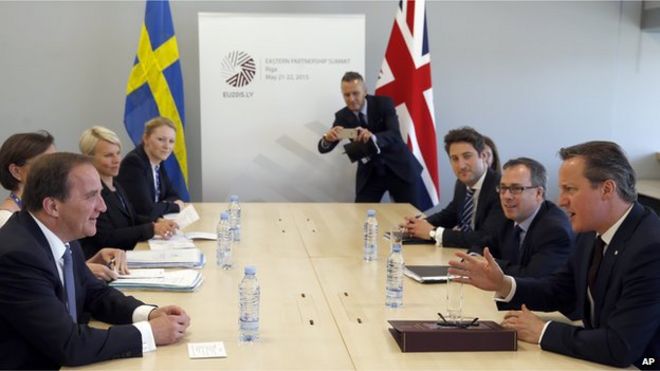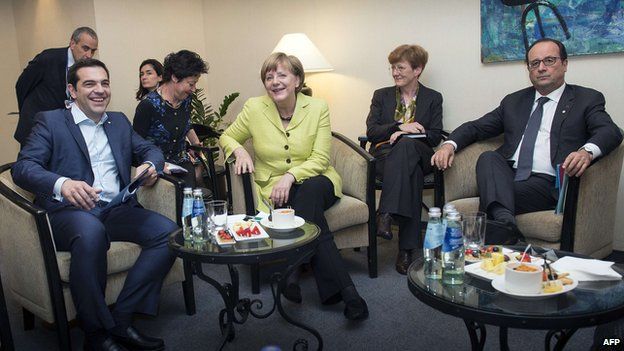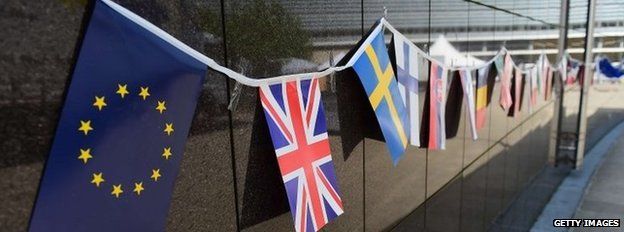- 8 hours ago
- UK Politics
- 1926

David Cameron has said he is confident he can get a better deal for the UK in Europe but admitted it "won't be easy".
Speaking at an EU summit in Latvia, he said he had not been greeted "by a wall of love" when he met EU leaders for the first time since his election win.
But he said he had a mandate and the "British people at his back" for the changes he wanted to achieve.
The prime minister will hold talks with Angela Merkel and EU Commission boss Jean-Claude Juncker next week.
Mr Cameron will also meet French President Francois Hollande as he tries to win support for his position.
Other EU countries have said they will listen to what the UK has to say, the Finnish prime minister Alexander Stubb saying he backed the UK's proposals to cut red tape and was sure "some kind of compromise" could be reached.
But some member states have questioned the need for any change to EU treaties, something Mr Cameron has said he wants to see, and ruled out any watering down of the key principle of freedom of movement.
Speaking at a meeting of EU leaders, Mr Cameron said he believed it was in the interests of both the UK and its European partners for the UK to remain part of the European Union but under different terms.
The British people, he said, were not happy with the status quo and wanted change on issues such as welfare, immigration and an opt-out from further integration.
'Best choice'
Mr Cameron said he had only begun to "scratch the surface" of the discussions but would travel to Berlin and Paris next week as well as hosting European Commission President Jean-Claude Juncker at his country residence, Chequers, on Monday.
He said the British people needed "the best possible choice" about the UK's future in Europe and did not rule out bringing forward his promised referendum, currently scheduled to take place by the end of 2017.
Mr Cameron said he expected "lots of ups and downs" in the process and reminding journalists that many of their pre-election forecasts were wrong, he urged them to "wait for the result".
"I do not expect to find agreed solutions straight away," he told them.
"These talks will require patience and tenacity. But by working together in the right spirit and sticking at it, I believe we can reform the EU and our relationship with it. And then the British people will have the final say. They will decide."

The changes he was seeking were "deliverable and doable", he insisted.
"I've set out a series of changes which I think address the main concerns that British people have, that I have, about Europe and the way it works. And I'm confident of getting those changes."
British officials said the process was at a very early stage, but the meetings with Mrs Merkel, regarded as Germany's most powerful leader and Mr Juncker, the most senior official in Brussels, will be seen as key to setting the tone for future discussions.
'Intricate'
Mr Cameron is committed to holding an in/out referendum on Britain's membership of the EU by the end of 2017, but there is speculation it could be held next year to avoid a clash with elections in France and Germany.
Legislation paving the way for the UK referendum is expected to be published next Thursday, the day after the Queen opens Parliament.
Asked whether he would be prepared to recommend a UK exit if he did not get the outcome he wanted, Mr Cameron said he would "not rule anything out".

EU referendum in focus

David Cameron is ready to start renegotiating the terms of Britain's EU membership ahead of a referendum. Here is some further reading on what it all means:

BBC deputy political editor James Landale said Mr Cameron had used the summit, arranged to discuss the EU's relationship with Russia and its neighbours, to sound out other European leaders about what they might be willing to accept before the start of "intricate" negotiations in the coming months.
Other EU leaders, he added, were "scared witless" by the possibility of the UK leaving the EU and were willing to listen and consider a deal, but there were some things - such as changes to freedom of movement rules - which were "sacrosanct".
Mr Cameron has not revealed the full details of what he is seeking from any changes, but he is expected to demand an opt-out from one its core principles of forging an "ever-closer union" between member states.
He will also try to get more powers to block or opt out of new EU laws, and for restrictions on welfare benefits for migrants until they have lived in the UK for four years.
This week, a number of UK business leaders started to highlight the potential implications of the referendum, with the president of the CBI saying businesses should "speak out early" in favour of remaining in a reformed EU,
The Labour Party, SNP, Plaid Cymru and the Lib Dems are in favour of staying in the EU. UKIP, which got almost four million votes but only one MP in the election, want to leave.

No comments:
Post a Comment